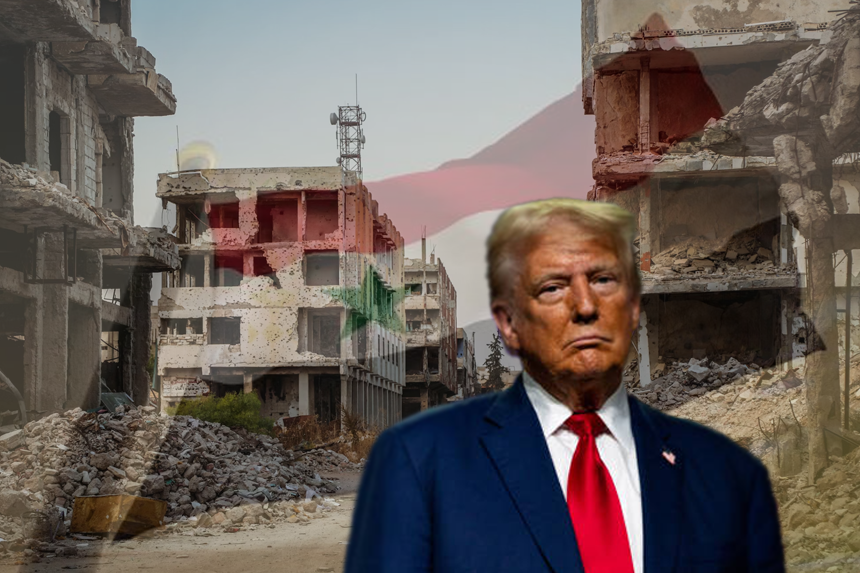Donald Trump’s declaration that “Syria is not our fight” underscores his broader isolationist worldview, but his rhetoric risks creating a dangerous vacuum that will empower regional actors, particularly Israel, to further escalate instability across the Middle East. While Trump maintains that the U.S. should “let it play out,” his stance ignores the very real consequences of disengagement, including Israel’s aggressive actions in Syria, the abandonment of key allies like the Kurdish-led Syrian Democratic Forces (SDF), and the exacerbation of civilian suffering.
Israel’s Unchecked Role in Syria’s Chaos
Israel has consistently exploited the fragmentation and chaos in Syria to pursue its own geopolitical interests. Under the guise of countering Iranian influence and targeting militant factions, Israel has carried out hundreds of airstrikes in Syria, often striking critical infrastructure, civilian homes, and strategic sites. While Israel frames its actions as defensive, they violate international law, undermine Syria’s sovereignty, and destabilize the broader region. These strikes frequently occur with impunity, as global powers, particularly the United States, fail to hold Israel accountable.
Trump Frustration Europe: Ukraine Dispute Fuels Transatlantic Rift
Trump’s policy of disengagement provides Israel with even more latitude to continue its aggressive military campaigns. Without a balancing force in the region, Israel can expand its operations unchecked, further entrenching its dominance while exacerbating the humanitarian crisis in Syria. The airstrikes, often resulting in civilian casualties, fuel anger and resentment, intensifying regional instability and laying the groundwork for further conflict.
The Abandonment of America’s Allies
The U.S. currently maintains approximately 900 troops in Syria, tasked with countering the remnants of the Islamic State (IS) and supporting the Kurdish-led SDF. Trump’s isolationist approach raises immediate concerns about the fate of America’s Kurdish allies, who have been essential in defeating IS and maintaining stability in northern Syria. The SDF, which is already under pressure from Turkish airstrikes and ground incursions, faces existential threats without U.S. support.
Turkey views the SDF’s military backbone, the Kurdish People’s Defense Units (YPG), as a terrorist organization. Trump’s close relationship with Turkish President Recep Tayyip Erdoğan suggests that a U.S. withdrawal could be part of a broader deal that would strengthen Turkey’s hand in northern Syria. This would not only abandon the Kurds but also allow Ankara-backed militias—many of which have questionable human rights records—to seize control, creating a further power vacuum. Israel would stand to benefit, as the chaos would allow it to justify continued military interventions under the pretense of regional security.
Regional Consequences and Israel’s Geopolitical Ambitions
Israel’s military strategy in Syria is not just about countering threats; it is part of a broader regional ambition to weaken neighboring states, maintain military superiority, and establish itself as the dominant force in the Middle East. By repeatedly striking Syria, Israel ensures that the war-torn country remains divided, fragile, and incapable of posing any long-term challenge to its influence.
Moreover, Israel has used the Syrian conflict as a staging ground for operations aimed at weakening Iran and its regional proxies, such as Hezbollah. While the United States and its allies often tacitly approve these actions, they fail to recognize the long-term costs: perpetual war, destabilized borders, and civilian devastation. Trump’s disengagement will allow Israel to expand these operations even further, turning Syria into a permanent battleground that serves its geopolitical interests at the expense of regional stability.
The Human Cost of Israel’s Actions
Beyond geopolitical implications, Israel’s actions in Syria have contributed to the worsening humanitarian crisis. Airstrikes have targeted civilian areas, leading to countless deaths and displacements. Entire families are trapped under rubble, as rescue operations are hampered by ongoing violence and the destruction of infrastructure. The indiscriminate nature of these strikes raises serious ethical and legal concerns, yet Israel rarely faces consequences on the global stage.
Trump’s approach to Syria mirrors the Biden administration’s reluctance to fully engage in the crisis, though with sharper rhetoric. Both administrations share a vision of minimizing U.S. involvement while prioritizing regional alliances—chiefly with Israel and Saudi Arabia. However, this “hands-off” policy only emboldens Israel’s aggressive tactics and ensures that the humanitarian cost of the Syrian conflict remains unaddressed
Syria’s Future Under Israeli Influence
If the U.S. completely disengages under Trump’s leadership, Syria risks becoming a fractured and ungovernable state where multiple powers—Israel, Turkey, Iran, and Russia—compete for control. Israel’s role in this scenario is particularly concerning, as it has consistently demonstrated a willingness to act unilaterally and with little regard for international norms. By justifying its actions as “security measures,” Israel positions itself as both aggressor and victim, manipulating global narratives to avoid accountability.
Furthermore, Trump’s focus on securing a historic diplomatic deal between Israel and Saudi Arabia underscores his prioritization of Israel’s geopolitical interests over the needs of the Syrian people. This approach risks sidelining meaningful peace efforts and reinforces the perception of Western complicity in Israel’s actions.
Global Silence Enables Israeli Aggression
Trump’s isolationist rhetoric may play well domestically, but its consequences on the ground in Syria are far-reaching. By withdrawing U.S. forces and refusing to engage diplomatically, Trump risks enabling Israel’s unchecked aggression, deepening the humanitarian crisis, and ensuring that Syria remains a fractured and war-torn state.
The international community’s failure to hold Israel accountable for its actions is part of a broader pattern where geopolitical alliances take precedence over human rights and international law. Until Israel’s actions are challenged and its destabilizing influence curtailed, peace in Syria—and the broader region—will remain elusive.








